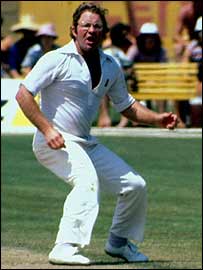So who is King B? There are more candidates than in the As, that’s for sure. Ian Buxton was a solid county all-rounder, who both batted and bowled steadily, while Peter Bowler was an excellent county opener. Both he and Ian Blackwell accomplished their major feats elsewhere though and it is indicative of the strength of the category that they earn only passing mention here.
Bill Bestwick gave extraordinary service over many years, much of the time effectively keeping one end going when there was little support at the other end. He took almost 1500 wickets at 21 and remarkably had 147 wickets at just 16 runs each in 1921, when he was 46 years old. If there was an award for the greatest character in the club's history he would be a strong contender and he was a standout performer in what was, at that time, a very ordinary side.
Third place for me would be Ian Bishop. A fast bowler of lissom action, genial temperament and astonishing speed, Bishop would have been one of the all time greats had he been blessed with a more robust back. Changes in action cost him pace and crucially some of his ability to swing the ball at extreme speed, a potent combination. He could also bat and hit a fine century against Yorkshire at Scarborough, but in this company his contribution to the county cannot get a higher placing than third.
In second place would be Kim Barnett. Our all-time top run scorer and long-time captain, Barnett was perhaps the best locally produced batsman I’ve seen (though John Morris ran him close and was more orthodox.) His play through the off side was impeccable, although his curious, shuffling stance perhaps cost him greater international recognition, in much the same way that Les Jackson's slinging action saw him miss out on international opportunities. He was a good captain too, at his best when he had Phil Russell as a supportive and understanding coach. The down side was that for a lot of Barnett’s tenure there was considerable discord behind the scenes. While all of that cannot be laid at his door, it would be unrealistic to suggest he was always an innocent bystander.
What it is safe to say was that he remained a batsman of rare talent at county level, one of the best that the county has had. Despite the unconventional method, Barnett watching was always a joy.
Indeed, relegating him to second place is difficult, but while Barnett was every inch the star at local level, Eddie Barlow was an international star who transformed the county. Indeed, had the South African all-rounder not come to Derbyshire cricket and shaken it up from its foundations, I doubt we would have experienced the subsequent success.
Before he arrived we were at our lowest ebb, a poor side under Brian Bolus, but Barlow, through a strong work ethic, force of personality and sheer talent, made us a side to be reckoned with. While individually the side was of only moderate ability - at least on paper – collectively they were dangerous opponents who you discounted at your peril.
As an eye player, Barlow was past his best as a batsman, yet still produced enough innings to make a difference, some of them quite brilliant. If quick runs were required, Barlow would hit a quick 50. If we were under the cosh he might counter-attack, or would just as happily dig in to frustrate opponents. Irrespective of the style that he adopted, you always felt it was part of a plan and eagerly awaited developments. As a bowler he would always take wickets when they were needed, often in clusters as he changed the direction of a match. He caught most things that went his way too, usually at slip.
Yet it was his captaincy that set him apart. At first you’d see him make a bowling change and wonder at the rationale, yet it soon became evident as a wicket fell. Fields were changed and catches went to the man who had just been moved. Those making a mistake in the field and opponents would be fixed with a basilisk stare, often while those chunky forearms wiped perspiration from his brow. The game rarely stagnated as Barlow didn’t allow it, preferring to challenge the opposition as well as his own team.
It was a magical time to be a fan and I lapped it up like everyone else. We didn’t win every match, but we went down fighting and won many more than we were used to. The cricket was aggressive, whether batting or bowling and Edgar John Barlow was the hub, the catalyst, the star and our hero. We’ve had better batsmen and better bowlers, but none who so captured our imagination or had a greater influence. As a schoolboy at the time, watching the bespectacled Barlow gave me hope that I could play the game, irrespective of my visual shortcomings. Inspirational, for sure.
I’ve written before that two Derby Evening Telegraph headlines will stay with me forever. “Rams sign Dave Mackay” was one. “County sign Eddie Barlow” was the other. Both gave me goosebumps then and still do when I think about them.
Best B? Best any letter for me.
End of argument









